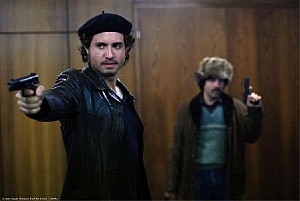After making the beautiful and melancholy ‘Summer Hours’, about three children dealing with the property of their deceased mother, Olivier Assayas decided to confound expectations by making a 3 part, 330 minute miniseries chronicling the career of the infamous terrorist Carlos, known (though not mentioned in the film) as ‘The Jackal’. After leaving his native Venezuela, Carlos -whose real name is Illich Ramirez Sanchez- joined ‘The Popular Front for the Liberation of Palestine’, committing several daring terrorist acts in Europe on their behalf, becoming, in effect, the most famous terrorist in the world until Osma Bin-Laden came along.
Assayas cut the material down for theatrical exhibition- the version shown at the festival is 165 minutes long. Many scenes that obviously went on longer fade out, and the 80’s are left out entirely from the story. As I don’t know what exactly the excised other half of this film holds, I can only assume that the film is an accurate representation of the miniserie’s intentions. What’s most surprising about Assayas’ take on the story is how straight-forward it is. It is rather old fashioned grandiose storytelling. It is an exciting and lively telling of the story, but it was surprisingly a-political, for a story that is so political in its nature.
Edgar Remirez plays the title role with great gusto and charisma, sounding just as convincing in Spanish, French and English. His Carlos is something of an enigma- it is difficult to tell whether it is idealism that drives him, fame, or pure psychopathology. But whatever drives him, he sure is good at terrorism. Seemingly fearless, he walks right up to a bank, throws in a bomb and calmly walks away. He also brazenly barges into a British businessman’s house and shoots him. His confidence shows throughout the daring raid on OPEC headquarters in Vienna, where, on Iraqi orders, he takes the delegates hostage and is given a plane by the Austrian authorities to transport the hostages to Algeria, en route to Baghdad. It is during this mission that Carlos earns the ire of the PFLP, and is effectively banished from the mainstream terrorist world. As he wanders the Middle East, teaching T.E. Lawrence to Sudanese guerrilla, dreaming about pulling off a grand operation, Carlos wastes away in a haze of drunken hedonism, until finally captured by the French authorities.
The only really overt political stance the film presents, is one where one of Carlos’ teammates on the OPEC raid, played by Christoph Bach, cuts off his ties to his terrorist companions after the raid on Entebbe. Bach’s character cannot abide the separation of Jews from gentiles, insisting that he is anti-Zionist, not anti-Semitic. I would have liked more of the overt political content, especially when as in this instance, recent events again raise the question of the ideological and practical connections between the extreme right and the extreme left.
That being said, ‘Carlos’ is one hell of an entertaining film. It is extremely convincing in it’s depiction of the volatile period it covers, is wonderfully performed, and is choreographed with great verve, with a terrific soundtrack to boot.






